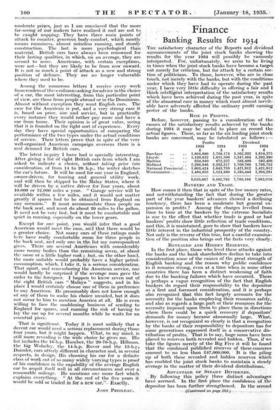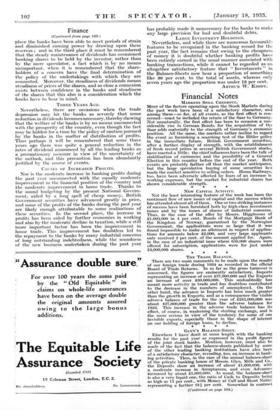Finance
Banicing Results for 1934 THE satisfactory character of the. Reports and dividend announcements of the joint stock banks showing the 'results, for the year 1984 will possibly be variously interpreted. For, unfortunately, we seem to be living in tithea'Wherithe joint stock banks have become a target not merely fOr criticism, but for attack by a certain sec- tion of politicians. To those, however, who are- in close touth, not-Merely with the banks, but with the conditions . tinder which they have had to operate during the past y.ear, I have _-very little difficulty in offering a fair and I think intelligint interpretation of the satisfactory results which have been achieved during the past year, in spite of the abnormal ease in money which must almost inevit- ably have adversely affected the ordinary prOfit earning power of the banks.
RISE IN PROFITS.
Before, however,' passing to a consideration of • the.; causes of the satisfactory results achieved by the banks during. 1934 it may be useful to 13lace on record the. actual figures. These, so far as the six leading joint stock banks are concerned, may be tabulated as follows :—
Pro_ fits 1933 - 1934 £ £ Dividend " 1933 1934 £ £ Barclays 1,604,680 1,708,174 1,562,202 1,614,275 Lloyds 1,438,822 1,651,506 1,347,464 1,392,380 Martins 654,940- - 672,257 582,406 582,466 Midland 2,266,846 2,292,217 1,709,760 1,766,752 National Provincial.. 1,603,424 1,643,759 1,421,912 1,421,912 Westminster.. .. 1,464,955 1,524,880 1,165,444 1,204,291
9,033,667 9,492,793 7,789,188 7,982,016
BANKERS AND TRADE. _ How comes it then that in spite of the low money rates, and notwithstanding the fact that during the greater: part of the year bankers' advances showed a declining tendency; there has been a moderate but general ex- pansion in profits ? Among the charges levelled from time to time at the bankers by the extreme Socialists is one to the effect' that whether trade is good or bad bankers' profits show little reflection of trade conditions, and this, it is maintained, goes to show that bankers have little interest in the industrial prosperity of the country. Not only isthe reverse of thistrue, but a careful examina- tion of the position also brings out the facts very clearly.
REVEALED AND HIDDEN RESERVES.
In the first place, those who level these attacks against the banks and the bank shareholders decline to take into consideration some of the causes of the great strength of English banking and the, reason why public confidence in it remains strong, even at a time when in some other countries there has been a distinct weakening of faith due to the banking failures which have occurred. There is perhaps a vague recognition of the fact that English bankers do regard their responsibility to the depositor as:a'first and foremost consideration, and it is perhaps also recognized .that this fact largely accounts for the necessity for the banks employing their resources safely, . and also as regards a large.part_of their resources for the necessity imposed upon them to place them in directions where there could be a quick recovery if depositors!. demands for money became *normally large. What; however, is not recognized so clearly is that a recognition by the banks of their responsibility to depositors has for some generations expressed. itself in a conservative dis- tribution of profits. That is to say, huge sums have been placed to reserves both revealed and hidden. Thus, if we take the figures merely of the Big Five it will be found that the combined published reserves of these concerns amount to' no less than D17,000,000. " 'It is the piling up of both these revealed and hidden reserves which has enabled the joint stock .banks to maintain a steady average in the matter of their dividend distributions.
ADVANTAGE OF STEADY DIVIDENDS.
By following this policy three distinct advantages have accrued. In the first- place the confidence of the depositor has been further strengthened. In the second • (Continvald ork .102.) .
Finance (Continued from page 100.)
place the banks have been able to meet periods of strain and diminished earning power by drawing upon these reserves ; and in the third place it must be remembered that the steady maintenance of dividends has occasioned banking shares to be held by the investor, rather than by the mere speculator, a fact which is by no means unimportant, when it is remembered that the share- holders of a concern have the final determination of the policy of the undertakings with which they are connected. Moreover, the steadiness of dividends means steadiness of prices of the shares, and so close a connexion exists between confidence in the banks and steadiness of the shares that this also is a consideration which the banks have to bear in mind.
THREE YEARS AGO.
Nevertheless, there are occasions when the trade depression- may • hit the •.banks so severely that- some reduction in dividends becomes necessary, thereby showing that the welfare of the banks is by no means unconnected with the prosperity of the country, even though the fact may be hidden for a time by the policy of caution pursued by the banks in the matter of distribution of profits. Thus perhaps it will be remembered that some three years ago there was quite a general reduction in the rates of dividend announced by all the leading banks as a precautionary measure in view of the uncertainty of the outlook, and this precaution has been abundantly justified by the course of events.
CAUSES OF INCREASED PROIITS.
Nor is the moderate increase in banking profits during the past year unconnected with the equally moderate improvement in the financial position of the e•ountry and the moderate improvement in home trade. Thanks to the sound budgeting by the present National Govern- ment, aided by a long spell of cheap money, British Government securities have advanced greatly in price, and some of the profits of the banks during the past year are -likely enough attributable to some realizations of these securities. In the second place, the increase in profits has been aided by further economies in working und also by the moderate decline in taxation, while a still 'more important factor has been the improvement in .home trade. This improvement has doubtless led to the repayment to the banks by many industrial concerns of long outstanding indebtedness, while the soundness of the new business undertaken during the past year has probably made it unnecessary for the banks to make any large provision' for bad and doubtful debts.
LARGE INVESTMENT HOLDINGS. Nevertheless, and while, there are numerous favourable features to be recognized in the banking record for the past year, the fact remains that owing to the cheapness of money it is doubtful whether banking profits have been entirely earned in the usual manner associated with banking transactions, while it cannot- be regarded as an altogether satisfactory feature that " Investments." in the Balance-Sheets now bear a proportion of something like 30 per cent. to the total of assets, whereas only seven years ago the proportion was under 13 per cent. ARTHUR W. KIDDY.







































 Previous page
Previous page